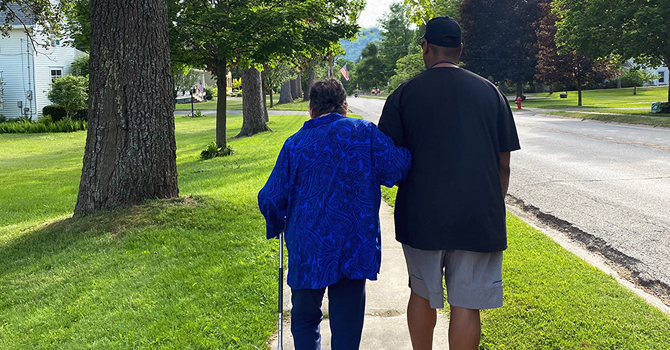Pouring from a Full Cup: Maintaining Health and Wellness for Caregivers of Older Adults with Chronic Disease

Alex Eanes, MPH ’20
An estimated 43.5 million people in the US provided unpaid care to an adult relative in 2015.1 Caregiving is extremely common, often unpredictable, and uncontrollable.
Caregivers spend an average of 20.5 hours per week providing care.2 This time does not account for the time spent devoted to caring for their own lives or the lives of their significant others and children.
The constant demands of caregiving can create physical and psychological stress with little opportunity for adaptation. It can be persistent and last for years, potentially resulting in negative physical and mental health outcomes for the caregiver.1
Caregivers are often navigating uncharted waters and might need guidance on how to most effectively navigate their new reality.
Public health professionals can be a source for referrals to appropriate agencies that might be best suited to meet their needs. While the care recipient is the one in need of help, caregivers simultaneously need help and support. Caregivers are often navigating uncharted waters and might need guidance on how to most effectively navigate their new reality. As public health professionals, there are different ways in which we can assist caregivers with shouldering their stress.
Support Systems
Caregivers need support systems to buffer the effects of burden and burnout. Support can be provided through both informal and formal relationships. Informal support includes friends, family, and neighbors. Formal relationships include support from public services, religious groups, and support groups.3 Social support from intimate social relationships may also positively affect a caregivers’ wellbeing in addition to formal social support. Both informal and formal support can result in less burden.3 Social support, whether in-person or online, has been found to be beneficial for caregivers, as it provides positive emotional support, space to share negative feelings and emotions, and coping strategies for caregiving difficulties.4
Time Away
If you are continuously providing care for someone else, there will come the time in which you need a break. One way to alleviate stress as a caregiver is by taking a break from providing care, even if it is for a small period of time. Even federal legislation agrees. The Lifespan Respite Care Act was passed in 2006 to provide quality respite care services for family caregivers. The ARCH National Respite Network website provides information about respite services available across the country. And public health professionals can help caregivers find their way to these and other resources.
Maintaining One’s Health
Finally, caregivers must maintain their own health. Their health is equally as important as that of the care recipient. As the phrase says, “You cannot pour from an empty cup.” You are better equipped to care for others when your own health is taken care of. Practitioners should encourage caregivers to maintain as normal of a schedule as possible. Self-care for caregivers includes eating well, setting time aside for exercise, continuing to see your own physicians for checkups, getting adequate sleep each night, and having coping strategies ready during times of burnout.
Caregivers must maintain their own health.
Caregiving can be a physically and emotionally taxing experience. But that burden can be reduced by following proper measures for self-management. As public health professionals, we must be aware of and provide information about the resources and skills caregivers need to maintain their own health while caring for a loved one.
References
- Schulz, Richard, et al, “Family Caregiving for Older Adults,” Annual Review of Psychology 71/1 (January 2020):635–659.
- Adelman, Ronald D., et al, “Caregiver Burden: A Clinical Review,” Journal of the American Medical Association 311/10 (2014): 1052-1060.
- Shiba, K., at al, “Informal and Formal Social Support and Caregiver Burden: The AGES Caregiver Survey,” Journal of Epidemiology 26/12 (2016):622-628.
- Oliver, Debbie Parker, et al, “The Effect of Internet Group Support for Caregivers on Social Support, Self-Efficacy, and Caregiver Burden: A Meta-Analysis,” Telemedicine and e-Health 23/8 (August 2017):621-29.
About the Author
 Alex Eanes, MPH ’20, recently completed his master's degree in Health Behavior and
Health Education. During his time at University of Michigan, he conducted HIV prevention
research under Dr. K. Rivet Amico. Eanes is currently an Associate on the Hepatitis team at the National Alliance of
State and Territorial AIDS Directors (NASTAD) in Washington, DC. His work strengthens governmental public health departments through
capacity building, technical assistance, and advocacy to improve health outcomes for
people living with hepatitis.
Alex Eanes, MPH ’20, recently completed his master's degree in Health Behavior and
Health Education. During his time at University of Michigan, he conducted HIV prevention
research under Dr. K. Rivet Amico. Eanes is currently an Associate on the Hepatitis team at the National Alliance of
State and Territorial AIDS Directors (NASTAD) in Washington, DC. His work strengthens governmental public health departments through
capacity building, technical assistance, and advocacy to improve health outcomes for
people living with hepatitis.
- Interested in public health? Learn more today.
- Read more articles by Health Behavior and Health Education faculty, students, staff, and alumni.
- Learn more in Caring for Our Caregivers: The Unrecognized and Undervalued Family Caregiver.
- Support research at Michigan Public Health.
